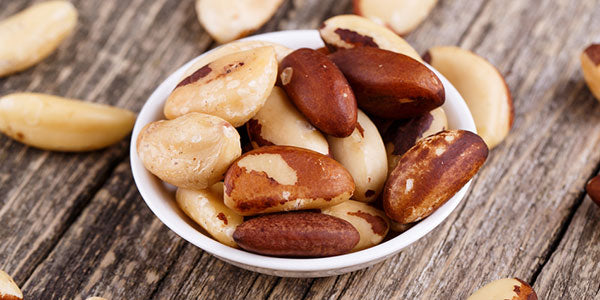
If you have ever purchased a combination of mixed nuts, Brazil nuts were more than likely among the others. Brazil nuts are the large nuts that often get sifted through and end up left at the bottom of the container. But the size of Brazil nuts matches its nutritionally profile – packed and powered with healthful fats and nutrients. You will not skip out on them after learning about these brazil nut benefits!
What Are Brazil Nuts?
Accustomed to South America, Brazil or Brazilian nuts have raised in popularity across the United States, often incorporated in mixed nut containers. The nuts come from the Brazil nut tree, one of the largest trees in the Amazon. The tree has quite the extensive life, as it has an average lifespan of 500 years and may even reach an age of 1,000! The harvest of Brazil nuts has decreased over the years with almost 105,000 tons in 1970, over 40,000 tons in 1980 just from Brazil alone, and currently 20,000 tons each year. But despite the plummet in harvesting numbers, individuals are still able to get their hands on these nutrient-dense nuts!
Brazil Nut Nutrition
The recommended serving size of nuts is one ounce, though the actual amount varies per nut – approximately 35 peanuts, 24 almonds, 18 cashews, 15 pecan halves and 6 brazil buts. Though the quantity is wide, calories are generally between 160 to 200 calories with 80 to 90 percent of those calories being from fat. Specific Brazil nut nutrition is identified in the table below:
*Adapted from USDA's National Nutrient Database
As identified, Brazil nuts are rich in fat. Additionally, Brazil nuts contain omega-6 fatty acids (a type of polyunsaturated fat) and may contribute to increased rancidity. Though omega-6 fatty acids can be healthful, it is important to keep their consumption in moderation. Along with macronutrients, Brazil nuts have a renowned vitamin and mineral profile, especially when it comes to their selenium content. One ounce or 6 kernels supplies 774 percent of selenium's daily value – that is over 10 times the recommended level! Along with selenium, Brazil nuts are significant sources of thiamin, vitamin E, zinc, magnesium and manganese.
Brazil Nut Benefits
Immune Health
Brazil nuts are a highly significant source of selenium. The potent and powerful antioxidant properties of selenium can contribute to a stronger immune system. Selenium deficiency, compared to adequate selenium intake, may result in weaker immune responses.
Heart Protective
Selenium deficiency not only compromises a strong immune system, but may also increase the risk of heart disease. Selenium helps to raise HDL or "good" cholesterol levels while lowing LDL or "bad" cholesterol levels.
Bowel Health
Adequate intake of fiber can promote regularity and reduce gastrointestinal conditions. And in conjunction with selenium, the risk of colon and rectal cancers is can be reduced up to almost 60 percent!
Optimized Metabolism
Selenium also helps to support healthy thyroid function, a gland that creates hormones affecting metabolism. Additionally, the B vitamins found in Brazil nuts help promote an efficient metabolism.
Skin and Cell Integrity
Brazil nuts contain potent antioxidants, mostly in the form of selenium and vitamin E. Antioxidants have been shown to fight against skin damage and decrease the appearance of aging. Vitamin E is further used to maintain the integrity and shape of cell membranes, ultimately protecting the health of skin.







